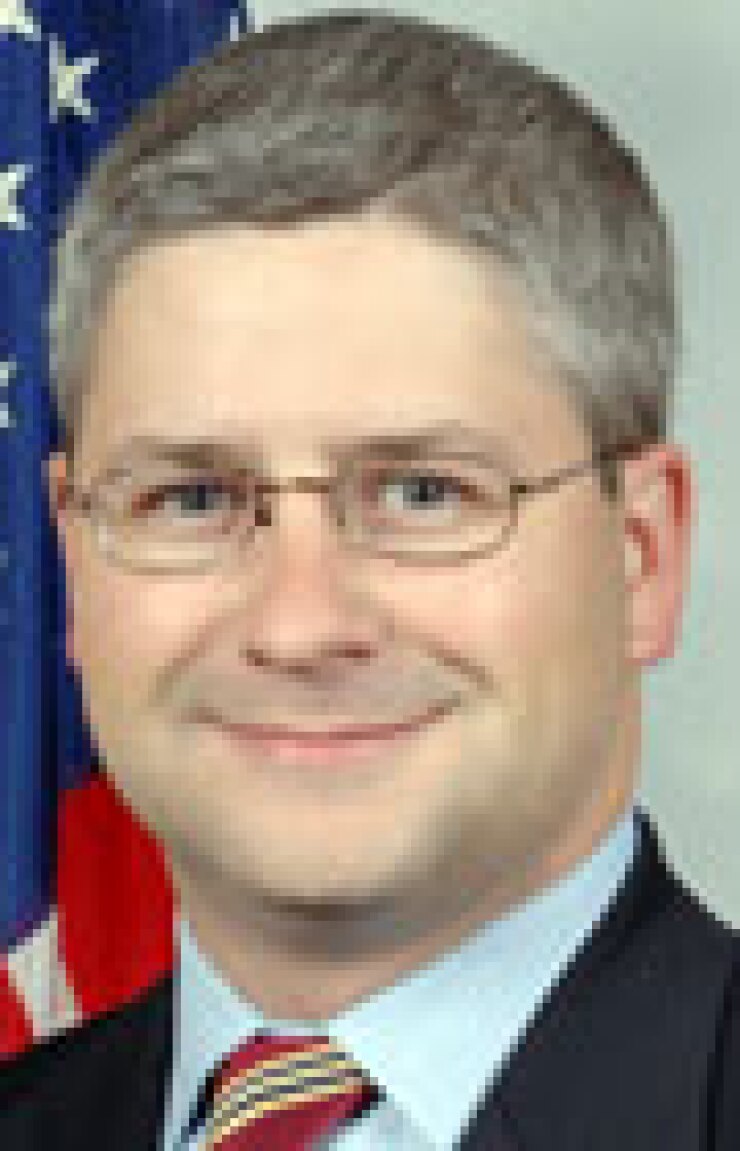
WASHINGTON — House panel members on Wednesday opposed federal bailouts for municipal governments and were reluctant to provide states with bankruptcy protection, but they seemed to support requiring improved public pension fund disclosure.
Members of the House Oversight and Government Reform Committee’s panel on TARP and Financial Services discussed these issues at a hearing called, “State and Municipal Debt: The Coming Crisis?,” against a backdrop of growing concern about the severe economic straits facing some governments.
“The perfect storm is brewing, already state and municipal governments are coming to Washington, hat-in-hand, expecting a federal bailout like so many others,” said Rep. Patrick McHenry, R-N.C., the panel’s chairman. “But the era of the bailout is over.”
While some Republicans, who fear that growing unfunded public-sector pension obligations could trigger a wave of defaults, explore drafting legislation to give states the option of filing for bankruptcy protection, several lawmakers on the panel telegraphed support for a middle ground: better public pension disclosure.
In his opening remarks, Rep. Mike Quigley of Illinois, the top Democrat on the panel, stressed the need for financially strapped states to impose fiscal reform, not resort to bankruptcy. The majority of states are well-managed, he said, but are struggling with deficits spawned by rising health care costs, underfunded pension plans and a recessionary dip in tax revenues.
Quigley said a few “bad apples,” including his home state, have mismanaged their state pension plans, but a “one-size-fits-all approach, like bankruptcy, could do more harm than good.” He stressed the need for states to impose “common-sense reforms” to improve their finances.
“All we need is the political will to get it done,” he said.
Several of the witnesses echoed Quigley’s remarks, saying states already have the tools they need to deal with fiscal problems, ranging from spending cuts and tax hikes, to stabilizing their finances and shoring up their pension systems.
“There’s no credible evidence of a bubble or crisis in state or local bonds,” said Iris J. Lav, a senior adviser at the Center on Budget and Policy Priorities.
As for pension plans, Lav said some states have shortfalls they will need to address over the long term, but that they can do so by readily available means: increasing pension contributions, which currently average 3.8% of operating budgets, to an average of 5 percent.
“From 3.8 to 5%is not a crisis,” she said.
Through their questions to witnesses, lawmakers on both sides of the aisle suggested they were grappling with less draconian solutions than tinkering with federal bankruptcy law, on one hand, and tapping federal largess on the other.
“Illinois is a mess,” said Rep. Joe Walsh, a freshman from that state. “No way is the federal government going to bail out our state. The constituents won’t allow it.”
Speaking to reporters after the hearing, McHenry also stopped short of endorsing bankruptcy as an option for troubled states, saying the federal government’s role is to promote enhanced disclosure.
“The first step is to admit something is wrong,” he said. “There are no other assumptions. We’re going to see where this goes.” McHenry said the subcommittee will hold another hearing in March and ultimately will issue a report on its findings to Congress.
One long-time market participant who did not want to be identified said the lawmakers and witnesses did not seem to understand the municipal market.
Dick Larkin, senior vice president and director of credit analysis at Herbert J. Sims & Co., said after watching the hearing: “Pensions are not causing insolvency. The funding costs are a relatively small part of state and local budgets.”
Federally mandated Medicaid programs have been the biggest driver of state and local spending, he said, noting that the issue did not come up until very late in the hearing.
Just one hour after McHenry adjourned the subcommittee hearing, several House and Senate Republicans convened a press conference to reintroduce legislation, first floated last December, to enhance disclosure obligations for public-sector pension systems. The Public Employee Pension Transparency Act is co-sponsored by Reps. Devin Nunes and Darrell Issa of California and Paul Ryan of Wisconsin.
Sens. Richard Burr of North Carolina and John Thune of South Dakota also support the bill and plan to introduce an identical version of it in the Senate.
The measure, which is substantively the same as the bill introduced during the last session, would impose reporting requirements on public-employee pensions. State and local governments that failed to comply with the requirements would forfeit their ability to issue tax-exempt bonds or receive federal subsidies on taxable municipal debt, such as Build America Bonds.
The Republican lawmakers said they expect to soon hold hearings on the bill and move it through Congress quickly.
Asked about the hearing before McHenry’s subcommittee, Nunes said bankruptcy law is complicated. He predicted there will be broad support, by contrast, for the joint legislation he just announced.
“This is the kind of bill that should pass on suspension,” Nunes said, referring to a suspension of the rules that provides for limited debate and no amendments.





